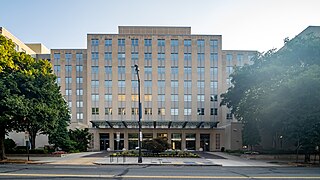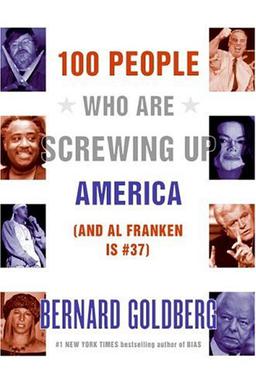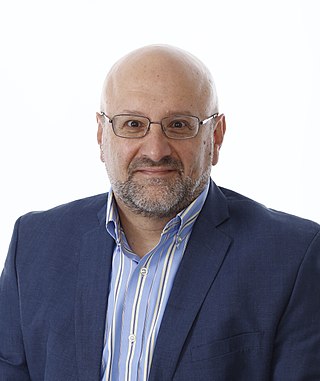Media bias occurs when journalists and news producers show bias in how they report and cover news. The term "media bias" implies a pervasive or widespread bias contravening of the standards of journalism, rather than the perspective of an individual journalist or article. The direction and degree of media bias in various countries is widely disputed.

Leo Brent Bozell III is an American conservative activist and writer. Bozell is the founder of the Media Research Center, an organization whose stated purpose is to identify perceived liberal media bias.
The Media Research Center (MRC) is an American conservative content analysis and media watchdog group based in Herndon, Virginia, and founded in 1987 by L. Brent Bozell III.

The Drudge Report is a U.S.-based news aggregation website founded by Matt Drudge, and run with the help of Charles Hurt and Daniel Halper. The site was generally regarded as a conservative publication, though its ownership and political leanings have been questioned following business model changes in mid-to-late 2019. The site consists mainly of links to news stories from other outlets about politics, entertainment, and current events; it also has links to many columnists.

The Brookings Institution, often stylized as Brookings, is an American think tank that conducts research and education in the social sciences, primarily in economics, metropolitan policy, governance, foreign policy, global economy, and economic development.
Weapons of Mass Distortion: The Coming Meltdown of the Liberal Media is a book by conservative activist L. Brent Bozell III, criticizing and documenting what Bozell described as the American news media's "liberal media bias."

Bernard Richard Goldberg is an American author, journalist, and political pundit. Goldberg has won fourteen Emmy Awards and was a producer, reporter and correspondent for CBS News for twenty-eight years (1972–2000) and a paid contributor for Fox News for ten years (2009–2018). He is best-known for his on-going critiques of journalism practices in the United States—as described in his first book published in 2001, Bias: A CBS Insider Exposes How the Media Distort the News. He was a correspondent for Real Sports with Bryant Gumbel on HBO for 22 years until January 2021.

Andrew James Breitbart was an American conservative journalist and political commentator who was the founder of Breitbart News and a co-founder of HuffPost.

100 People Who Are Screwing Up America is a non-fiction book by conservative pundit Bernard Goldberg that was published in 2005. The book's central idea is to name and blame a long list of specific individuals whom Goldberg implicates in making the United States a "far more selfish, vulgar, and cynical place." In 2006, Goldberg updated his book, releasing 110 People Who Are Screwing Up America.
Claims of media bias generally focus on the idea of media outlets reporting news in a way that seems partisan. Other claims argue that outlets sometimes sacrifice objectivity in pursuit of growth or profits.

The Urban Institute is a Washington, D.C.–based think tank that conducts economic and social policy research to "open minds, shape decisions, and offer solutions". The institute receives funding from government contracts, foundations, and private donors.

Herbert Joseph Davenport was an American economist and critic of the Austrian School, educator and author.
Brendan Nyhan is an American political scientist and professor at Dartmouth College. He is also a liberal to moderate political blogger, author, and political columnist. He was born in Mountain View, California and now lives in Hanover, New Hampshire.

Steven G. Horwitz was an American economist of the Austrian School. Horwitz was the Distinguished Professor of Free Enterprise in the department of economics in the Miller College of Business at Ball State University in Muncie, Indiana. In 2017, he retired as the Dana Professor of Economics Emeritus at St. Lawrence University.
Matthew S. Levendusky is an American political scientist, best known for his 2009 book The Partisan Sort: How Liberals Became Democrats and Conservatives Became Republicans. His work has primarily focused on explaining political polarization, but also includes media analyses and topics related to public opinion and American foreign policy. Levendusky is currently associate professor of political science at the University of Pennsylvania.
Academic bias is the bias or perceived bias of scholars allowing their beliefs to shape their research and the scientific community. It can refer to several types of scholastic prejudice, e.g., logocentrism, phonocentrism, ethnocentrism or the belief that some sciences and disciplines rank higher than others.
The political views of American academics began to receive attention in the 1930s, and investigation into faculty political views expanded rapidly after the rise of McCarthyism. Demographic surveys of faculty that began in the 1950s and continue to the present have found higher percentages of liberals than of conservatives, particularly among those who work in the humanities and social sciences. Researchers and pundits disagree about survey methodology and about the interpretations of the findings.
Neil Louis Gross is the Charles A. Dana Professor of Sociology and chair of the department of sociology at Colby College. He is also a visiting scholar of New York University’s Institute for Public Knowledge. He has written several books on sociological and political topics, and also blogs for The Chronicle of Higher Education. Gross edited the American Sociological Association's journal Sociological Theory from 2009 to 2015. He previously taught at the University of Southern California, Harvard University, Princeton University, and at the University of British Columbia.
Traditionalist conservatism in the United States is a political, social philosophy and variant of conservatism. While classical conservatism has been largely based on the philosophy and writings of Aristotle, Edmund Burke, and Joseph de Maistre, the American variant has been influenced by thinkers such as John Adams and Russel Kirk.
Jeffrey Dennis Milyo is an American economist and professor of economics at the University of Missouri. He is also a senior fellow at the Cato Institute. One of his best-known studies is a 2005 one that he co-authored with Timothy Groseclose examining media bias. The study concluded that most major media outlets in the United States have a liberal bias, although its methodology has been criticized. He has also researched the political effects of campaign finance laws in the United States.










